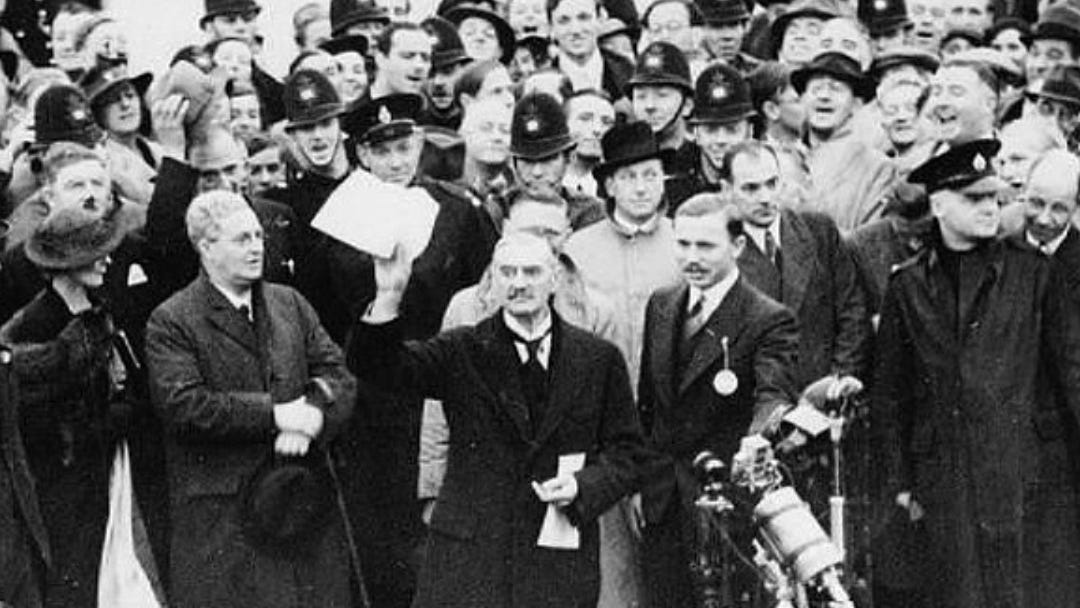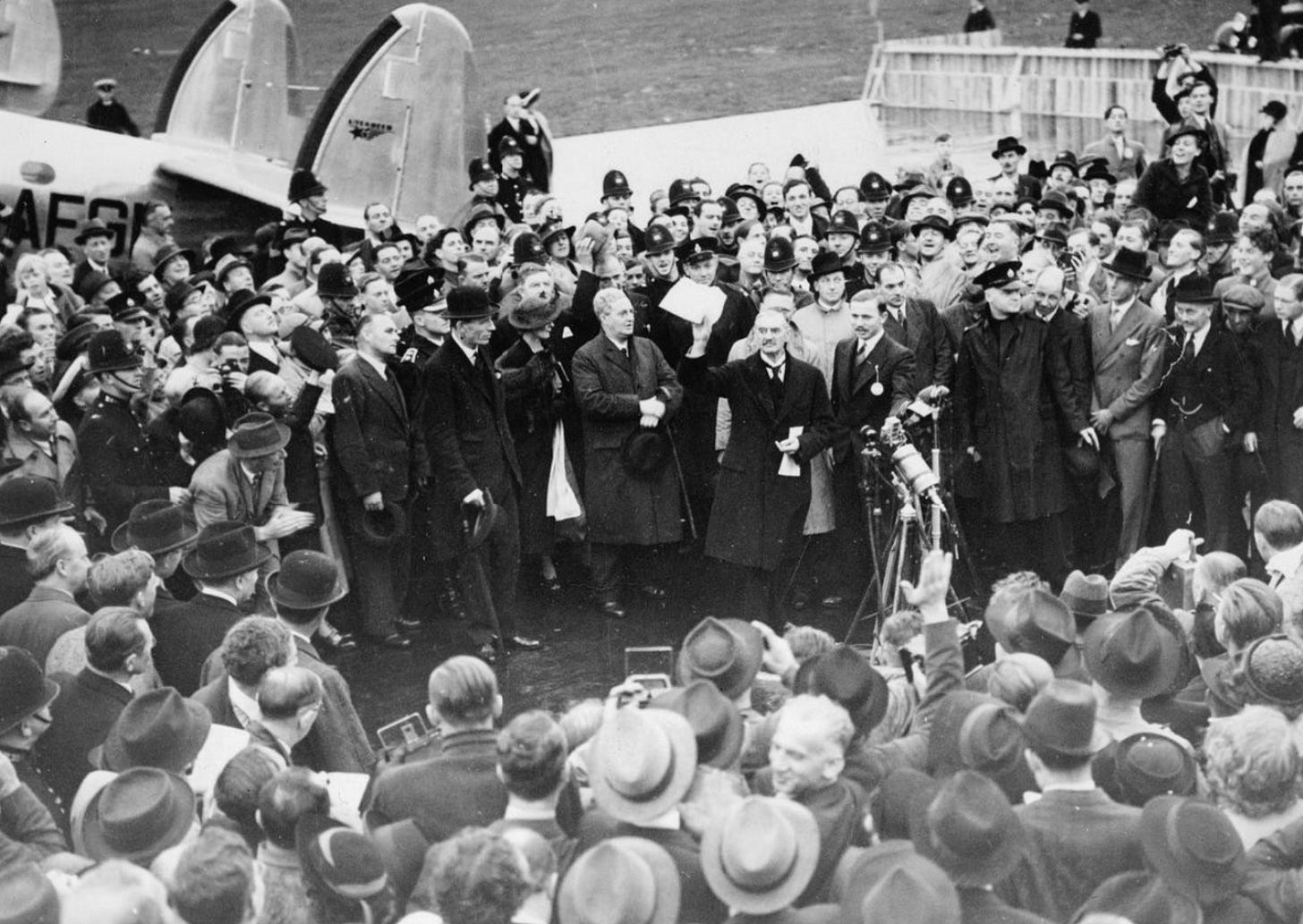
Sometimes, the most significant moments in history aren't clear until we look back. I've spent years working on and writing about global security, but today, I struggle to process the seismic shifts of these past days. Trump's actions regarding Ukraine and Europe will fill history books that have yet to be written, and the scholars who will analyze these will have what we lack today - the clarity of hindsight.
When History Shifts Beneath Our Feet
In my study at home, there's a small black and white photograph that shows my father at thirteen, a passport-style portrait dated May 13, 1940. On the back, three simple words: "just in case." The photo was taken just three days after Nazi Germany invaded the Netherlands. My father lived in a seaside village near The Hague, where battles still raged, and the airport had already fallen. Within days, Rotterdam would burn, and the Netherlands would surrender.
I often wonder what went through my grandmother's mind that day. What made her take her son to a photographer amid the chaos of invasion? She must have sensed that they were living through one of those moments when history shifts beneath your feet.
This memory surfaced again on the morning of January 7, 2021. I remember exactly where I was when I read the message from an American friend suggesting that the previous day's events at the Capitol might have been an attempted coup. Though I had watched the chaos unfold in real-time, the word - "coup" - hadn't crossed my mind, nor had any reporter used it until I switched off my screens in Europe, which must have been the late afternoon in Washington D.C. Sometimes it takes distance to see what's right in front of us.
Now, as Europe grapples with the aftershocks of this weekend's Munich conference, I think again about my family in The Hague in 1940. They knew their world had changed dramatically but couldn't possibly grasp how or what would come next. Taking that photograph must have given some sense of being in control or at least still having room for initiative. We find ourselves in a similar moment of confusion and clarity - watching history unfold in real-time, trying to make sense of events that future generations will study in textbooks.
The Fog of Breaking News
The chaos we're witnessing isn't accidental - it's a fog deliberately created to obscure the magnitude of what's happening. Most traditional and social media treat this weekend's developments in Munich as just another Trump story among many.
It isn't.
There was no purposely created foggy news landscape on 9/11; the terrorist attacks were the only news. Imagine that the New York Times would have had two headlines on 9/11 of similar print and length, one about the Twin Towers and another about "parking lot frisbee games."
Well, that was the NYT this weekend, where Trump's remake of foreign policy competed with the frisbee story. NYT, please keep your eye on the ball - or frisbee; peace and prosperity are at stake here. In the days and weeks after 9/11, we all knew that this moment in history demanded our undivided attention, even if we couldn't fully comprehend its significance. We didn't know yet, on 10/11, about Afghanistan, Iraq, or Guantanamo Bay, but we knew there would be a before and after 9/11 world.
Munich: Where History Repeats
This weekend's events demand such attention. In a matter of days - perhaps even hours - the U.S. administration has started dismantling eight decades of European security architecture. The speed is breathtaking, reminiscent of last week's examples of how quickly democratic institutions can crumble when attacked from within.
The signals from Washington carry echoes of other historical turning points: Europe, once the cornerstone of American foreign policy, has been suddenly relegated to the sidelines. Even more telling is our exclusion from the upcoming talks in Saudi Arabia - talks that, in a cruel twist of history, exclude the very nation whose sovereignty is being negotiated.
What do we call negotiations where the victim of aggression isn't present? Today's concessions to Russia - Ukraine's pre-2014 borders deemed negotiable, NATO membership off the table - feel like pages torn from long-abandoned diplomatic playbooks. Perhaps the most striking development is the demand for half of Ukraine's mineral wealth as "repayment" for previous military aid. This approach transforms support for democracy into a business transaction, making the Marshall Plan to rebuild post-war Europe a distant memory.
History has a way of choosing its stages carefully, and Munich keeps drawing us back to pivotal moments. Its streets have witnessed the full cycle of democracy's fragility. In 1923, a failed coup in a Munich beer hall launched Hitler's political career. Fifteen years later, in 1938, European leaders gathered here to surrender Czechoslovakia's sovereignty in a misguided attempt at "peace in our time."
And no, Czechoslovakia had not been invited either.
From Climate to Security: Connected Crises
Between the Beer Hall Putsch of 1923 and the Munich Agreement of 1938, this city witnessed how quickly democracy can unravel. Georg Elser understood this when he planted his bomb in Munich in the Bürgerbräukeller in 1939, a desperate attempt to stop what by then had become unstoppable. This weekend, the echoes in Munich were not those of marching boots, breaking glass, or a bomb; it was the sound of crying and grief. Words spoken and abandoned principles made the chairman of the world's most crucial security conference cry on stage.
It reminded me of that other crying chairman on stage. In December 2009, at the closure of the Climate COP 15 in Copenhagen, the Executive Secretary of the UNFCCC broke down in tears after the conference failed to deliver a legally binding treaty on climate action.
In those days, I worked on the relationship between climate change and security. Increasingly, I see the relationship work both ways; not only does climate change exacerbate security threats, but it is also that in an increasingly insecure world, there is even less willingness to take climate action.
Peace enables climate solutions, but climate action also facilitates peace.
Looking back at that photograph of my father from 1940, I wonder what future generations will see when they look at images from Munich this weekend. Will they, like us studying the Munich Agreement of 1938, wonder how we couldn't see what was coming? Or will this be remembered as the moment when we finally recognized the echoes of history and chose a different path?
Dear Reader,
These are challenging times politically and environmentally. If we work together, we can do better on this beautiful but fragile planet. In my daily notes, I share short moments of beauty in nature, like today's whale shark. I write about nature and travel in my newsletters, but many also cover our challenges, like chaos politics and climate action, which I covered in today's newsletter.
Please subscribe to this newsletter to support this initiative and for the full experience.
Alexander Verbeek







"Just in case." Chilling.
On Jan 6 I listened as Rachel Maddow used the word "protesters." I tweeted her and her staff, "This is an insurrection." I'm sure I was not alone. She used that word minutes later.
I cry daily and know others who do as well. Those who don't, worry me most.
Well, today, in my small Southwest town, we were a couple thousand strong, turned out on a cold February day, to stand up for democracy and the rule of law. It was at least a little heartening and uplifting in wake of this weekend’s darkness. Thanks Alex for another moving piece on how much we are losing so fast at the hands of ignorant madmen…💔